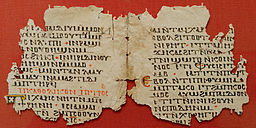This is the fifth in a series of posts about unnecessary repetition in the Bible.
The first chapter of 1 Chronicles repeats a lot of the genealogy lists from Genesis.
In the middle of Exodus 6, it says God told Moses to go tell Pharaoh to let his people go, and Moses objected that Pharaoh wouldn’t listen to him because he wasn’t a good speaker. Then the writer decides to interrupt the story to tell you all about Moses’s genealogy. And when that’s over, the chapter ends by saying that God told Moses to go tell Pharaoh to let his people go, and Moses objected that Pharaoh wouldn’t listen to him because he wasn’t a good speaker.
A later chapter of Exodus says when the Egyptian army tried to cross through the parted sea, God put the water back in place and drowned them all, but the Israelites were able to walk all the way through the sea on dry ground. Then in the next chapter, it says the same thing.
In the book of Numbers, God tells Moses to climb a mountain and look at the promised land from a distance. He tells him he’s going to die on that mountain without getting to actually enter that land, because Moses “disobeyed” God at Meribah. Then the book of Deuteronomy has God tell Moses the same thing. I don’t know if this is supposed to be the same event or if God is just repeating himself, but it seems pretty unnecessary either way.
Joshua tells the people what to tell their children about the monument made from stones taken out of the Jordan river. Then later in the same chapter, he tells them again? Or it tells about him telling them, again, or whatever.
The book of Joshua tells how Othniel married his cousin Aksah after Aksah’s father promised to give her to whoever captured Kiriath Sepher, and how Aksah asked her husband to ask her father for some springs of water, but then she asked him herself instead. Then the book of Judges tells about all that again.
There are passages in Joshua and 1 Chronicles that both list which towns the Levites got from each tribe (though the numbers and names don’t always match very well…).
The last chapter of Joshua tells about Joshua’s death, and then the second chapter of Judges says almost exactly the same thing, but with one sentence moved to a different place.
Continue reading The Bible repeats itself too much—Part 5: Retelling the same story again for no reason →
